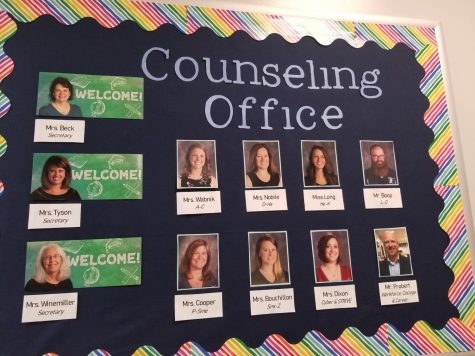The Counseling Chronicles
Part I: New Name, New Approach
Dallastown’s counseling office gets a new name and a new look to offer a warmer welcome to all students. They hope to meet more of students’ needs in better ways.
Recently, students called to “Guidance” may realize it’s not for grades or to figure out plans after high school, but for completely different reasons that may include their academics, social or emotional needs.
Dallastown Guidance Department has recently evolved into the Counseling Department. The term school counselor instead of guidance counselor shows that their role is more than just preparing for college or writing letters of recommendation. It’s about the whole student.
Dallastown school counselor Mrs. Wabnik said,”We really want to be more focused on mental health, not just academics. So, that is what the role change is helping with. It’s kinda like how a stewardess changed to a flight attendant, so that their role can incorporate more and can really make a difference. That’s exactly what we are trying to do as a school.”
This change, however, is not just within the halls of Dallastown High School, but with many schools around the United States with the help of the American School Counselor Association.
The goals of ASCA are to meet needs, set standards, expand roles, and become proactive instead of reactive to help students before a crisis, which is what ultimately inspired the name change.
According to ASCA, “Historically, the term guidance counselor was used to refer to counselors working in the schools. This term has evolved to school counselor as the scope of the duties have changed.”
The traditional term guidance would only reach some students and individual groups and refers to the reactive ways to help students after a crisis has occurred, rather than the whole school.
The newer concept of counseling focuses on the needs of students as a whole and school improvement along with individual needs and proactive ways to help students before a crisis happens.
According to the ASCA, originally guidance was meant to have five parts: information, assessment, counseling, placement, and follow-up. Over time, people became more future focused and the guidance office became a place where students planned their future.
Once again, the times are changing. Counselors are realizing students may need help with things other than just planning for the future.
Counseling aims to help students mentally and academically. So how does this evolution in terminology and approach directly affect Dallastown students?
The role evolution has allowed Dallastown to start many new programs to help groups of students at a time with a more variety of issues.
Instead of a one-on-one meeting with a counselor, students can now take part in programs ranging from college, military, and workforce workshops to workshops about drugs and emotional needs.
There also have been small groups started for things like grief, attendance, stress, family stressors, and more.

There are many counselors available for students to talk to about anything including social, academic, and emotional needs. While each counselor is assigned a group of the alphabet, they are ready and willing to talk to anyone if an issue arises.
“There is a need in our school for a variety of topics that don’t necessarily have to do with academics, so changing our role a little is helping us meet the needs of more students,” Wabnik said.
While students will still visit the counseling office for “guidance” on their future, it is now not just limited to that. Students now have the opportunity to be better equipped for life after high school in every way both academically and emotionally.
Stay tuned for Part II in this series about the workshops offered by the Dallastown High School Counseling Office.
Your donation will support the student journalists of Dallastown Area High School. Your contribution will allow us to purchase equipment and cover our annual website hosting costs.